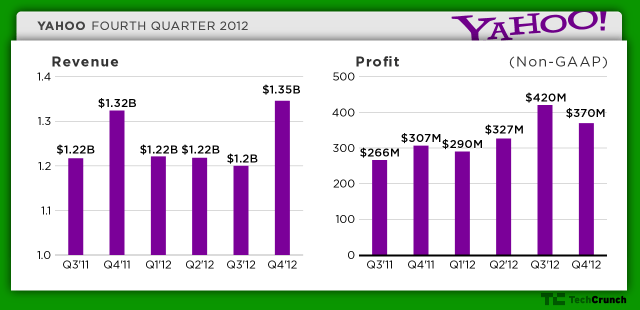Considering the long-standing struggles of Yahoo as a business, its board of directors battles, and Scott Thompson's "ResumeGate", Yahoo (and its investors) have been in sore need of some good news. When beloved Google exec Marissa Mayer took the helm as CEO back in July, finally Yahoo had a cause for optimism.
Today, Yahoo released its financial results for Q4 2012, which marked the end of Mayer's second full quarter at the helm and showed that new CEO's efforts to implement a turnaround are truly underway. For starters, the company showed the first signs of progress in that regard, with revenues coming in at $1.22 billion with non-GAAP EPS at 32 cents — a 4 percent year-over-year increase.
But the real question is, now that the Honeymoon period is coming to a close, whether Mayer will be able to provide the infusion of energy and leadership that Yahoo needs to regain its former position as an innovative, Web giant and not a has-been. At the annual World Economic Forum meeting in Davos, Switzerland, Mayer gave us a glimpse into her plans for getting Yahoo back on its feet, which the CEO elaborated on in today's fourth quarter earnings call.
The company's financial results were better-than-expected today, and Yahoo's stock saw a 4 percent rise in after-hours trading, with a 26 percent gain overall over the last six months — certainly cause for optimism.
During the investor call today, Mayer showed that Yahoo is renewing its focus on its people — on talent acquisition — something that's largely been missing in recent times. Yahoo has become well-known for its bureaucracy and employees identified around 385 "annoyances or barriers" in the fourth quarter, Mayer said today. To change that, the company is trying to lower its attrition rate by hiring better people and the CEO said that Yahoo is starting to make progress in this regard, seeing a marked "increase in the volume and quality of the people joining Yahoo" in the last six months.
Much of this is owed to the appeal of being able to work with Mayer herself, who made note of Max Levchin's joining the company's board of directors (Levchin is a co-founder of PayPal and Slide, among others) as well as the hiring of recruiting guru Sandy Gould (formerly of Disney) and the promotion of Adam Cahan to lead mobile.
Yahoo has also stepped up M&A of late, through its acquisitions of Pinterest-style news startup, Snip.it last week, video chat startup OnTheAir in December and Stamped in October.
These acquisitions offer a glimpse into the areas of its business where Yahoo sees big opportunity going forward. To help catalyze its turnaround and generate new growth, the team identified a dozen or so products that it will begin focusing on more aggressively, "each a digital daily habit," the CEO said during the company's investor call this afternoon. The new releases of Flickr mobile and Yahoo Mail in December acting as the first steps in this regard.
Mayer said that the biggest opportunities for Yahoo lie in "search, display, mobile and video," and, in search, especially, Mayer still sees "a lot of headroom." On top of that, Yahoo's focus going forward will be to improve engagement, with the key being personalization. While mobile growth hasn't begun to show true results as of yet, the company remains focused on growing its mobile footprint, specifically in mobile, where Mayer says that the company has already begun to sell ad space six months in advance, which is "just getting started."
As to the challenges Yahoo will face in the future? The new CEO said that the company has identified three key challenges: "Increasing usage, growing our international presence and appealing to a broader demographic of users — roughly in that order of priority."
As for mobile, Mayer thinks that Yahoo is in a good position, as its strengths correlate directly with behaviors that users are already using mobile for, like checking the weather, getting the news, financial quotes, checking email, sports scores, and so on. Yahoo already has the content that people want on their phones, it has these daily habits, but the challenge is providing more value around those habits.
The real question, of course, is how Yahoo will monetize its mobile properties, which, luckily, is something that the CEO spent quite a bit of time at Google thinking about — on a daily basis. Yahoo saw mobile adoption rise to more than 200 million monthly unique users, which "from a monetization perspective is still nascent for Yahoo," she said.
The other troubling statistic for Mayer was that about 75 percent of the company's revenue was derived from the Americas region, something that needs to change as Yahoo moves forward.
But, largely, the conversation with analysts focused on mobile and Yahoo's push to monetize on that front. Mayer wasn't eager to share too much in the way of traction, but commenters pushed on that regard, asking if there was any risk to the company focusing too aggressively on mobile — with the possibility of cannibalizing desktop search.
"There may come a point where cannibalization happens," Mayer says, "and we're positioning ourselves to better understand mobile. But we're still pushing to getting 50 percent of our engineering staff on mobile — I think this is something that'll happen. We've already started to shift some of our engineering teams to focus more on mobile, and we need to get to critical mass on that." Mayer also noted that Yahoo hired 120 new employees with computer science degrees in the fourth quarter, most of which are being allocated to new areas, Mayer said, presumably mobile and video.
While no one seems to have figured out the panacea for mobile monetization pains, Mayer said that it's just a matter of getting the right format, pricing and dynamics to encourage quality ads that match with what users are doing on mobile. When users are moving en masse to mobile, it's not rocket science to figure out that this is an area where companies need to be investing, it's just a matter of how.
 For years, the CEO said, search wasn't a money maker, but that's ridiculous today. For now, she said, it's all about experimentation and being on the cutting edge of that experimentation so that when a best-case scenario is identified, Yahoo will be better positioned to capitalize on that solution.
For years, the CEO said, search wasn't a money maker, but that's ridiculous today. For now, she said, it's all about experimentation and being on the cutting edge of that experimentation so that when a best-case scenario is identified, Yahoo will be better positioned to capitalize on that solution.
Analysts also pointed out that Yahoo will be hard-pressed to compete in terms of investment in R&D compared to its competitors, which could make the road towards innovation a little bumpier. Mayer said that Yahoo has taken to investing in fast, nimble, small teams — and already has small teams in place for iPad, iPhone and Android. "Everything starts with a small team," she continued, "and we think they'll end up changing our products and our user base and hopefully even change the world for the better."
Of course, let's not forget about search. In the future, search will continue to be a "key area of investment for Yahoo," Mayer said, and its "search alliance" partnership with Microsoft has led to some "nice increases in our key metrics."
That being said, the CEO remains convinced that the company needs to continue to increase its investments in search interface, because "all of the innovations in search from here are going to happen at the user interface level," both for desktop and mobile. Mayer also pointed out that Siri on the iPhone actually uses Yahoo's data and includes links to its services and that Yahoo will continue to investigate ways to make investments in this area as it moves forward.
The future of search, at least in the Yahoo CEO's conception of it, will be one that's far more personalized than what the company offers today. To provide this new era of personalization, the engines will have to know where you are, what context you're searching for something, who you're talking to and more — all of which will come to the fore in the next three to five years, Mayer recently said at Davos.
So it wouldn't be surprising to see Yahoo delving more deeply into developing its users' interest graphs to help it better inform its future personalization technology. In this regard, Yahoo will be able to build on the data collected from its homepage and media properties. But, it's clear that Mayer and Yahoo have begun thinking about the best ways to capture and leverage the opportunity that is beginning to manifest around interests and the interest graph.
Of course, while Yahoo leadership is not a loss for ideas (which may already represent huge progress from Yahoo Past), implementing those ideas, experimenting and monetizing, while trying to stave off competition from its rivals is a tall order. But, be that as it may, there's a lot more confidence in Yahoo's chances with Mayer at the helm than there have been in a long, long time.
For more, check out Sarah's recent post on Marissa Mayer's talk at Davos here, and you can find more on Yahoo's fourth quarter earnings, in Colleen's post here.
Yahoo was founded in 1994 by Stanford Ph.D. students David Filo and Jerry Yang. It has since evolved into a major internet brand with search, content verticals, and other web services. Yahoo! Inc. (Yahoo!), incorporated in 1995, is a global Internet brand. To users, the Company provides owned and operated online properties and services (Yahoo! Properties, Offerings, or Owned and Operated sites). Yahoo! also extends its marketing platform and access to Internet users beyond Yahoo! Properties through its distribution network...
Marissa Mayer is CEO of Yahoo. Previously as a VP at Google, Marissa Mayer led the product management and engineering efforts of Google's local, mobile, and contextual discovery products including Google Maps, Google Maps for Mobile, Local Search, Google Earth, Street View, Latitude and more. At 36 years old, she was also the youngest member of Google's executive operating committee. During her 12 years at Google, Marissa led product management and design efforts for Google web search, images, news,...

No hay comentarios:
Publicar un comentario